- Islamic creed
- /
- Creed and Quran Miraculousness
Forward:
In our 29th lesson about Aqeedah and Quran Inimitability, we are, noble brother, still discussing the main factors of the Divine Assignment: the universe, the reason, Al-Firtah, lust and choice.
1- Choice evaluates deeds:
Last lesson, we discussed the choice man has been given and I explained to you, due to Allah the Almighty's Grace, that choice values deeds. A deed gets its value from the fact that you do it willingly. In fact, Allah the Almighty wants the relation with His worshippers to be based on love and compassion:
((Verily, those who believe [in the Oneness of Allah and in His Messenger (Muhammad, peace be upon him)] and work deeds of righteousness, the Most Beneficent (Allah) will bestow love for them (in the hearts of the believers).))
This love is between Him and them and among them, so that they love one another. If Allah had forced us to be obedient to Him, His reward would have been meaningless, if He had forced us to sin, then His Punishment would have been meaningless too. Therefore, the value of your deed is that you have been given the free choice to perform them.
2- Man is driven in few limited aspects:
I also explained to you that there are some issues where you have no choice in, but they are imposed on you. For example, you have no choice in being male or female, you cannot choose your parents, you have no choice in the place or the time of your birth nor have you any choice in your characteristics, abilities, energy and appearance. However, the dignified scholars have agreed on the fact that -those issues which you have no choice in- are due to Allah's Wisdom. A scholar expressed this idea by saying, "Things cannot be more perfect than what they have been." When he wanted to explain it more he said, "I cannot have things more perfect than they are (the way Allah 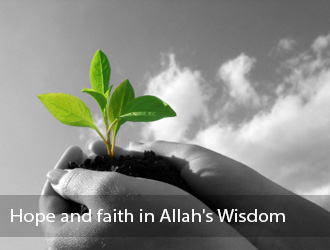 has granted them to me)." When things are revealed to you on the Day of Resurrection and you know the wisdom behind everything, you cannot but say, praise be to Allah, the Lord of the Worlds.
has granted them to me)." When things are revealed to you on the Day of Resurrection and you know the wisdom behind everything, you cannot but say, praise be to Allah, the Lord of the Worlds.
((And the close of their request will be: Al-Hamdu Lillahi Rabbil-'Alamin [All the praises and thanks are to Allah, the Lord of 'Alamin (mankind, jinns and all that exists)].))
The Prophet, peace be upon him, educated his Companions, may Allah be pleased with them, in such a way that made one of them (our Master Ali, may Allah be pleased with him) say, "By Allah, Even if the veils were raised (the unseen was disclosed to him), nothing would be added to my certitude in faith.". It means that my deep belief in Allah's Wisdom, Mercy and Justice should do not change before and after the wisdom behind things are revealed to me. This is how deep and strong man's faith is, and so he is content with Allah's seemingly bad Qada' (Divine Predestination). Another Companion, said, "By Allah, had I known that I would die tomorrow, I would not have done any more deed". Success lies in having great faith and sound beliefs.
Dear brother, we are in desperate need of having a correct and sound belief. As I said earlier, you have the free choice to do the Divine Assignments. For instance, you are ordered to be honest, but you can choose whether to be honest or not, and you are ordered to be trustworthy, but again you have the choice to be so or not. Furthermore, you are ordered to perform Salah, but it is up to you whether to perform it or not, and you are ordered to fast, but again you have the choice to do so or not. You have the choice in everything you are ordered to do. Whatever order you have the choice in doing it has a great value, since you had the choice of not doing it.
3- Reward and punishment would have been meaningless if we had been driven::
I emphasized in a previous meeting that if you had been driven to do the orders, reward and punishment would have been meaningless, Heaven and Hell would have been insignificant, the Divine Assignment would have been canceled and bearing the trust would have been cancelled too. Everything in religion would have been canceled when you mistakenly think that Allah has imposed your deeds upon you. This is the doctrine of compulsion, which is a corrupt one that paralyzes man.
I once told you that a man who was seen drinking intoxicant was brought to the giant of Islam and the rightly guided Khalifah, Umar bin Al-Khattab, may Allah be pleased with him, to be punished. He instructed them to carry out Al-Hadd punishment (A punishment fixed in the Quran and hadith for crimes considered to be against the rights of Allah) on him, but the man said, "By Allah, Khalifah, Allah has decreed that I drink intoxicants", to which the Khalifah said, "Execute Al-Hadd twice; once because he was drinking and the other because he fabricated lies in the Name of Allah." He said to him, "Woe to you! Allah's Qada' would not get you out of choice into compulsion".
4- Attributing mistakes to Al-Qadar and trying to avoid responsibility:
Last lecture, I also explained to you that man tends to escape responsibility, so he attributes all his intentional and unintentional mistakes and negligence to Al-Qada' and Al-Qadar (Divine Predestination and Decree). He may say, "Well, Allah has decree that I am wretched." This is not true, because you caused your own wretchedness. Someone else may say, "Allah the Almighty has not given me what I want, and He has not willed to guide me". I seek refuge in Allah, Allah, Glorified and Sublime be He, says:
((Truly! Ours it is (to give) guidance,))
Someone might say, "Allah, Glorified and Sublime be He, has not inspired me to perform Salah." Such words are false, so when someone says, "He has not decreed that I am guided", or "He has not decreed that I perform Salah" manifest an attempt to escape the truth. Hence, do not ever try to attribute your mistakes to Al-Qada' and Al-Qadar.
Everything happens due to Allah's Will, Wisdom and Goodness:
I also clearly explained that believing in Al-Qada' and Al-Qadar does not exempt one from responsibility. The evidence is in what Allah, Glorified and Sublime be He, says: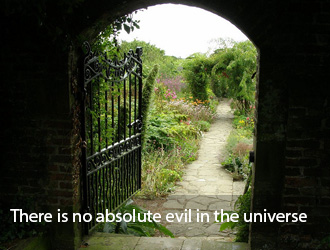
((Verily! Those who brought forth the slander (against 'Aishah (may Allah be pleased with her) the wife of the Prophet, peace be upon him) are a group among you. Consider it not a bad thing for you. Nay, it is good for you.))
Why was it good? Because everything happens due to Allah's Will, and whatever Allah wills happens. Allah's Will is related to the absolute Wisdom, which in its turn is related to the absolute Goodness. It does not suit the Divine Lordship to have something happened in His Kingdom without His Will. Furthermore, it is unacceptable and illogical to have something happened in Allah's Kingdom without His Decree. Whatever happens is due to Allah's Will. In other words, He allowed it to happen. What Allah wills happens, but this Will is related to the absolute Wisdom which is related to the absolute Goodness. Therefore, we should all believe that there is no absolute evil in the universe, because it means that evil exists for the sake of evil itself, and this contradicts the Existence of Allah. What suits the Perfection of Allah is that Allah employs the relative evil to serve the absolute goodness, and the evidence is:
((Say (O Muhammad, peace be upon him): "O Allah! Possessor of the kingdom, You give the kingdom to whom You will, and You take the kingdom from whom You will, and You endue with honour whom You will, and You humiliate whom You will. In Your Hand is the good.))
He does not mention the word evil, because giving and taking away the kingdom, endowing honor and humiliation are all good:
((Say (O Muhammad, peace be upon him): "O Allah! Possessor of the kingdom, You give the kingdom to whom You will, and You take the kingdom from whom You will, and You endue with honour whom You will, and You humiliate whom You will. In Your Hand is the good. Verily, You are Able to do all things.))
Having wrong beliefs corrupts man's deeds and makes him miserable:
I would like to repeat this point again: The most crucial thing in Islam is Al-Aqeedah; if you have a 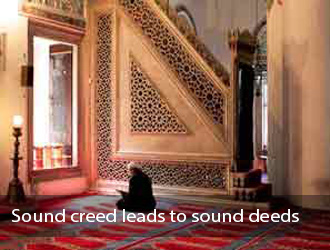 sound Aqeedah, then your deeds will be right, and if a man's deeds are right, he will be safe and happy. Thus, what makes Aqeedah the most crucial thing in Islam is the fact that if it is corrupted, man's deeds will be corrupted, and so he will be miserable and damned.
sound Aqeedah, then your deeds will be right, and if a man's deeds are right, he will be safe and happy. Thus, what makes Aqeedah the most crucial thing in Islam is the fact that if it is corrupted, man's deeds will be corrupted, and so he will be miserable and damned.
We can make a comparison between the wrong belief and the broken scale. Whatever is weighed in such a scale will not be accurate even if it is weighed for 100.000 times, the weight will be inaccurate in each time. The inaccurate weight is resulted from the broken scales, and so it can never be precise, whereas the mistake in the weighing itself can be fixed. Much in the same line, making mistakes while doing the Divine Assignment is a 1000 times better than having wrong Aqeedah. Thus, you should reconsider your beliefs and review them attentively in order to accept and adopt whatever you find correct and get rid of whatever you find wrong.
Dear brother, had we had no proofs (Shari'ah texts), people would have said whatever they wish:
((This knowledge contains the rules of the religion, so look thoroughly into the person from whom you acquire the knowledge of your religion.))
((O Ibn Umar, your religion, your religion is your flesh and blood. Take it from the pious ones, and do not take it from those who deviated.))
Evidences that prove man's free choice:
First of all, what is the evidence that man has been given the free choice? I would like to explain and clarify this point by referring to the evidences that are mentioned in the Quran, in the Prophetic Sunnah, in the sayings of As-Salaf- As-Saleh (the righteous ancestors) and in the incidents and stories which happen in our daily life.
1- The logical realistic evidence:
Quran contains orders and prohibitions:
I once mentioned this example to you. If we measure how wide someone's shoulder is and we write the number down (let us say it is 63.5 cm), then we build two walls leaving between them a distance that is exactly equal to the width of that person's shoulders, and we ask him to walk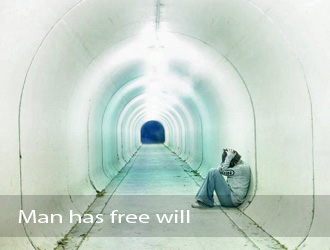 through it to the right or to the left, Does our order make any sense? Is our order applicable? In contrast to these meaningless orders, the orders and prohibitions in the Noble Quran indicate that man has been given the choice. Do you think that there is any meaningless word in Quran? If man is fully driven to do his actions as some ignorant people claim, and that his deeds are imposed on him, orders and prohibitions in the Quran are worthless. I am just giving you a realistic, rational and logical evidence about the free choice man has been given. Hence, as long as there are orders and prohibitions in the Quran, then there is a choice given to man.
through it to the right or to the left, Does our order make any sense? Is our order applicable? In contrast to these meaningless orders, the orders and prohibitions in the Noble Quran indicate that man has been given the choice. Do you think that there is any meaningless word in Quran? If man is fully driven to do his actions as some ignorant people claim, and that his deeds are imposed on him, orders and prohibitions in the Quran are worthless. I am just giving you a realistic, rational and logical evidence about the free choice man has been given. Hence, as long as there are orders and prohibitions in the Quran, then there is a choice given to man.
If you say to a prisoner in a locked cell, "Do not be late at night" this is non-sense. Unlike this order, the orders in the Quran are Divine:
((And perform As-Salat (Iqamat-as-Salat), at the two ends of the day and in some hours of the night [i.e. the five compulsory Salat (prayers)].))
((Perform As-Salat (Iqamat-as-Salat) from mid-day till the darkness of the night (i.e. the Zuhr, 'Asr, Maghrib, and 'Isha' prayers), and reauthor the Qur'an in the early dawn (i.e. the morning prayer). Verily, the recitation of the Qur'an in the early dawn is ever witnessed (attended by the angels in charge of mankind of the day and the night).))
The following Ayah is another order:
((And come not near to the orphan's property, except to improve it,))
The Quran is full of orders and prohibitions, and they would have been meaningless if you had not been given the free choice. Whoever claims that man is forced to do his actions accuses the Quran of containing meaningless Ayaht.
The first point I would like to highlight in this blessed meeting, insha' Allah, is that orders and prohibitions in the Quran and Sunnah indicate that man has been given the choice, and this is a fact.
2- Evidences from Quran:
The second fact: The clear and obvious Quranic Ayat are Qat'iyat Ad-Dalalah (definitive).
The first Ayah:
((Then whosoever wills, let him believe, and whosoever wills, let him disbelieve.))
The second Ayah:
((Verily, We showed him the way, whether he be grateful or ungrateful.))
The third Ayah:
((For every nation there is a direction to which they face (in their prayers). So hasten towards all that is good.))
The pronoun they in the Ayah refers to the nations, so Allah, Glorified and Sublime be He, orders them saying:
((So hasten towards all that is good.))
Is it possible for someone who sits in the back seat of the car to be able to turn to the left or to the right if we order him to do so? Of course not, because he cannot reach the steering wheel. However, in the Ayah, the direction of each nation is well known to them, and so they are ordered to hasten to do good deed.
((So hasten towards all that is good.))
This means that you have the steering wheel in your hand. This Ayah is fundamental in clarifying the fact that man has been given the free choice.
The fourth Ayah:
The decisive Ayah that proves that you have been given the free choice is the following: Allah the  Almighty says:
Almighty says:
((Those who took partners (in worship) with Allah will say: "If Allah had willed, we would not have taken partners (in worship) with Him, nor would our fathers,))
May you pay attention to these words? This Ayah can be applied to most of what common people say, such as, "Well, Allah has not willed to make me on the Right Path", "Allah has not willed to make me pray" or "Allah has not willed to guide me yet."
((Those who took partners (in worship) with Allah will say: "If Allah had willed, we would not have taken partners (in worship) with Him, nor would our fathers, and we would not have forbidden anything (against His Will)." Likewise belied those who were before them, (they argued falsely with Allah's Messengers), till they tasted of Our Wrath. Say: "Have you any knowledge (proof) that you can produce before us? Verily, you follow nothing but guess and you do nothing but lie."))
You are deluded and mistaken if you think that Allah the Almighty does not want to guide you:
((Those who took partners (in worship) with Allah will say: "If Allah had willed, we would not have taken partners (in worship) with Him, nor would our fathers, and we would not have forbidden anything (against His Will)." Likewise belied those who were before them, (they argued falsely with Allah's Messengers), till they tasted of Our Wrath. Say: "Have you any knowledge (proof) that you can produce before us? Verily, you follow nothing but guess and you do nothing but lie."))
How can we understand the Ayat which seem to be referring to the fact that man is driven and things are imposed on him? Someone might say, "These Ayat are clear, precise, obvious and Qat'iyat Ad-Dalalah, but there are other Ayat that need to be explained". Some of these Ayat are the following:
((And if We had willed, surely! We would have given every person his guidance))
You might think that Allah has not willed to make you guided:
((And if We had willed, surely! We would have given every person his guidance, but the Word from Me took effect (about evil-doers), that I will fill Hell with jinn and mankind together.))
This Ayah needs to be explained. It means; O My slaves, you claim that I forced you to perform wrongdoings and bad deeds, but if you think so then you are deluded. Had I forced you to do something, I would have forced you to be guided. If I had cancelled your free choice, the Divine Assignment you are ordered to do, bearing the trust, what makes you peculiar (the reason), in order to impose something on, I would have imposed one thing on you, which is guidance. Therefore, these bad deeds are done by your free will, and you will be held accountable for them.
This point is very crucial. If you are a pharmacist and you need an employee to work afternoon shifts, this employee should have certain knowledge about medications. However, you need to test him. If you put some drugs at the table, and then you say, "This roof is for the anti-inflammatory drugs, this one is for analgesics and this one is for tonics.. Let me see where you can put these drugs", you should let him do it alone, lest the test is meaningless. If he wants to put the toxins where the tonics should be, you stopped him, then you will cancel his choice, as well as, the test. Since he is being tested, he is given the choice. Thus, you should keep quiet when he takes some drugs and misplace them, because if you say, "Put them in here", then you will cancel the test. Therefore, one of the prerequisites of performing the Divine Assignment is to be given the free choice.
((And if We had willed, surely! We would have given every person his guidance, but the Word from Me took effect (about evil-doers), that I will fill Hell with jinn and mankind together.))
Your deeds are purely and utterly your choice. Hence, you earn your own deeds, and you will be held accountable for them.
Al-Ayat Al-Mutashabihat no matter how many they are interpreted through Al-Ayat Al-Muhkamat no matter how few they are:
Whatever Ayah you read feeling that it indicates compulsion in one way or another, you should know that it has a delicate meaning. We have a fundamental rule concerning this point. You may find this lesson difficult, because it is about delicate issues supported with theoretical evidences, but we seek Allah's Help to help us explain and understand it. There are Ayat Muhkamat (entirely clear and plain) and there are Ayat Mutashabihat (they are not clear). The fundamental rule says that no matter how many Al-Ayat Al-Mutashabihat are, we explain them based on the meaning of Al-Ayat Al-Muhkamat no matter how few they are. If I say, "Wheat is a dangerous substance in man's life", the word dangerous has many meanings, so we wander if it is as dangerous as the ticking bomb, or it is dangerous in the sense that it is a basic substance in man's his life, without which man dies.
Thus, the word dangerous here has many synonyms, but if I say, "Wheat is a basic and useful substance in man's life", then the meaning is clear. We have two sentences; the first sentence is not clear as the word dangerous which has many synonyms used as follows: wheat is a dangerous substance in man's life, whereas the second sentence is precise and clear. In order to understand the first sentence (Wheat is a dangerous substance in man's life) which has many meanings when it is compared with the second one (Wheat is a basic and useful substance in man's life) I depend on the meaning of the second sentence when I interpret the first one, and so the meaning will be clear.
The following are Ayat Muhkamat:
((Then whosoever wills, let him believe, and whosoever wills, let him disbelieve.))
((Verily, We showed him the way, whether he be grateful or ungrateful.))
The following Ayah is Muhkamah (singular of Muhkamat):
((For every nation there is a direction to which they face (in their prayers). So hasten towards all that is good.))
The following is another Ayah Muhkamah:
((Those who took partners (in worship) with Allah will say: "If Allah had willed, we would not have taken partners (in worship) with Him, nor would our fathers,))
There are Ayat where you might think that they contain compulsion, such as the following one:
((But He sends astray whom He wills and guides whom He wills.))
Allah's punitive misguiding is based on the slave's choice of going astray:
The most magnificent interpretation I read about these Ayat is that if man's misguidance is attributed to Allah the Almighty, then it is a punitive misguiding which is based on a voluntary choice of going astray, and the evidence is:
((So when they turned away (from the Path of Allah), Allah turned their hearts away (from the Right Path).))
When they turned away from Allah's Path, Allah truly turned their hearts away. To clarify this point, consider this example: when a university student does not attend any classes, does not get the books nor does he have the exam, he gets a first warning. If he is indifferent toward it, he will get a second warning and a third one, and if he keeps ignoring all of them, the administration of the university will issue a decision of suspending his registration, which means that his registration will be cancelled. Is this decision not an embodiment of the student's choice of refusing to attend classes, to get the books and to have the exams? Definitely it is.
((So when they turned away (from the Path of Allah), Allah turned their hearts away (from the Right Path).))
When they chose to go astray, Allah the Almighty decreed to make them misguided. Hence, when misguidance is attributed to Allah, it is a punitive one:
((But He sends astray whom He wills and guides whom He wills.))
I repeat, when this misguidance is attributed to Allah the Almighty, then it is a punitive misguidance that is based on the voluntary choice of going astray. The following is the precise and rigorous evidence:
((So when they turned away (from the Path of Allah), Allah turned their hearts away (from the Right Path).))
There are very precise rules concerning the verb forms in the Arabic language, such as the ones which have the pattern of the verb Af'al (to I do), which means that I found them like that. Accordingly, when Allah says, ""We made them heedless" it does not mean that heedlessness was created in them, but rather it means that He has found them heedless:
((And obey not him whose heart We have made heedless of Our Remembrance,))
When we say, "We have known some people, and we have not made them cowardice" we mean that they are not cowardice. Also, when we say, "We have known those people, and we have not made them stingy", it means that they are not stingy:
((And obey not him whose heart We have made heedless of Our Remembrance,))
It means that do not obey whoever is heedless. I would like to repeat again that whenever misguiding people is attributed to Allah, this misguidance based on their choice of going astray.
Judgmental misguidance:
Let me give you an example concerning this kind of misguidance. Assume that you were on your way to the city of Homs before signs were put, and you reached crossroads; one was to the right and the other one was to the left. You were confused which road you had to take, so you asked a man who was standing over there, "Which way takes me to Homs?" He said, "The right one." You said, "May Allah reward you." Then the man went one saying, "Wait a minute, after 5 kilometers there is a dangerous crossroads, 7 kilometers further there is a slippery lane and after a few more kilometers there is a narrow bridge where there is a check point to check if you have any illegal goods." The man gave you such precise information, and so you were more grateful to him.
said, "May Allah reward you." Then the man went one saying, "Wait a minute, after 5 kilometers there is a dangerous crossroads, 7 kilometers further there is a slippery lane and after a few more kilometers there is a narrow bridge where there is a check point to check if you have any illegal goods." The man gave you such precise information, and so you were more grateful to him.
Suppose that another person reached that crossroad and asked that same man, "Which way takes me to Homs?" and he answered, "The right one", but he said, "You are a liar", and the man did not give him any further details, that would be because he totally refused his advice, and this is a negative misguidance. When you turn away from religion as a whole, you will be deprived of all religious details, as if Allah the Almighty misguides you. In other words, He deprives you of religious details that would save you and make you happy, and this is another kind of misguidance.
Dear noble brother, if misguidance is attributed to Allah, Glorified and Sublime be He, then it is the punitive one that is based on a chosen misguidance. Also, there is the judgmental misguidance, which is the result of refusing religion. As long as you refuse religion, you will be deprived of all the religious details which enable you to be guided to the Right Path. As it is clarified in the abovementioned example, when the traveler said to the guide, "You are a liar", refusing his advice although the guide knew accurate details about the road, and which they would have been useful to him, he was deprived of all the details that would have saved you. This is called the judgmental misguidance.
Misguidance out of Allah's Wisdom (for the sake of Tawheed):
We still have another kind of misguidance. It is when Allah, Glorified and Sublime be He, misguides the worshipping slaves from whoever they associate in worshipping Him:
((They (the angels) will say: "Where are those whom you used to invoke and worship besides Allah," they will reply, "They have vanished and deserted us." And they will bear witness against themselves, that they were disbelievers.))
When you pin your hopes on man and forget Al-Wahid (the One), Ad-Dayyan (the Judge), Allah, Glorified and Sublime be He, will clearly misguide you away from Him and will misguide that man away from you, and so you will be disappointed. When you pin your hopes on a strong and close man forgetting about Allah, Glorified and Sublime be He, Allah Glorified and Sublime be He, will misguide you for your own good; He will inspire that person to desert you and turn his back on you. This misguidance is manifested in keeping you away from him and making him forsake you, and this out of Allah's Jealousy for you.
The noble Companions, may Allah be pleased with them, are at the top of people made a mistake in Hunain (one of the Muslims' battles). They were about 10.000 people, which was something unprecedented in the Arab Peninsula, so they thought they were secured, and they said, "We will never be defeated due to fewness." They subconsciously relied on their large number, so Allah, Glorified and Sublime be He, made them disappointed by their huge number, and so it did them no good:
((Truly Allah has given you victory on many battle fields, and on the Day of Hunain (battle) when you rejoiced at your great number but it availed you naught and the earth, vast as it is, was straitened for you, then you turned back in flight.))
This kind of misguidance is meant for the sake of Tawheed (believing in the Oneness of Allah). Hence, when you mistakenly think that there is a powerful party you can rely on, forgetting about Allah Al-Wahid Ad-Dayyan, Allah will inspire this powerful party to let you down and to turn away from you, in order to discipline you for that hidden Shirk (implicitly associating partners with Allah in worship). Thus, you are deserted by whoever partner you associate with Allah in worship and by the party you rely on and trust forgetting Allah, Glorified and Sublime be He. As I have just said, Allah disciplines you for the hidden Shirk you commit by inspiring the party and whoever you rely on to turn their back on you.
A dear friend of you may say, "I am at your service" putting you at ease, but the minute you are in trouble, he will disappoint you. He will not even ask you to have a seat and tell him what the matter is. Moreover, when you tell him about your problem he will say, ""I am sorry, but this is none of my business, as it is not one of my capacities." You will be shocked upon hearing these words. Keep in mind that this kind of misguidance (abandonment) is for the sake of Tawheed.
In this lesson, it has been made clear to you, insha' Allah, that man has been given the free choice, and had he not been given it, reward and punishment would have been meaningless. Our Master Ali, may Allah be pleased with him, said, "Allah, the Glorified, has ordered His worshippers to act by free will and has cautioned them and refrained them (from evil). He has placed easy obligations on them and has not put heavy obligations. He gives them much (reward) in return for little (action). He is disobeyed, not because He is overpowered. He is obeyed but not under force."
The scientific topic: The creation of man:
Let me move now to the scientific topic.
1- The miracles of Allah's Creations indicate His Knowledge:
I once read the following amazing saying, "Everything in the universe is Allah's Miraculous Creations, such as the galaxies, comets, starts, earth, mountains, deserts, rivers, lakes, fish, birds, plants and man." They are all part of Allah's Miraculous Creation, and they indicate Allah's Almighty knowledge. Let us discuss some details in the creation of Man.
Dear noble brother, Allah the Almighty says:
((Verily, We created man of the best stature (mould),))
2- The Fertilized Egg:
If you lick your finger and put it in some salt very lightly without pressing it against the salt, then you get a magnifying glass, you will see very small particles of salt. The fertilized egg by the sperm is as small as those salt particles. However, after nine months, this fertilized egg becomes a baby.
3- The hair:
Man's head has 300.000 hairs; each of which has its own artery and vein, muscle and nerve, fatty and chromosomal glands. How great this creation in man's head!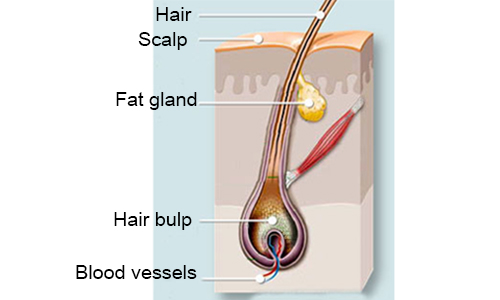
4- Man's brain:
There are 140 billion cells in the gray matter in the brain, whose function remained obscure until 2000. Above these cells there are 14 billion epithelial cells that include the memory, judgment, deduction, conclusion, sight, hearing and speech. The cortical cells and the brain itself are the most complex thing in the world. Oddly enough, the brain is unable to understand itself.
 The judgment is located in the forelock:
The judgment is located in the forelock:
((Nay! If he (Abu Jahl) ceases not, We will catch him by the forelock,* A lying, sinful forelock!))
Making a judgement is located in the forelock. In other parts of the brain, there are the sight, the hearing, the memory, etc. In fact, the memory is as small as the grain of lentil. Yet, it stores 60 billion images. The brain has many functions it cannot understand:
((Were they created by nothing, or were they themselves the creators?))
The brain cells are static; they never change or renewed.
5- The eye:
The eye has cornea which is an extremely transparent layer, and it is transparent, because it has special properties. The peculiarity of the eye is that the cells of the cornea are fed by lymph (a transparent fluid), not by the capillaries. If the cells had been fed by the capillaries, we would have seen through a net, but Allah made this layer in the eye purely transparent in order to have a clear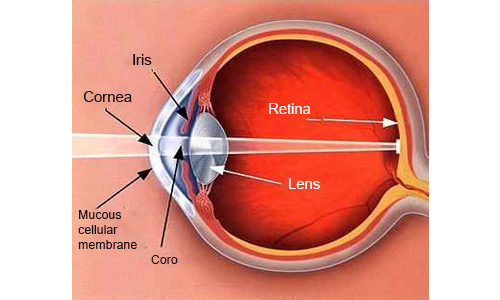 vision:
vision:
((The Work of Allah, Who perfected all things))
There are 10 layers in the retina; the total number of the bacilli and cones in the retina is 130 million, which means that the retina's space is a millimeter and a third. In fact the millimeter has 100 million light photoreceptors, while the most advanced and professional digital camera can only have 10.000photoreceptors:
((Have We not made for him a pair of eyes?))
The human eye can distinguish up to 80 million colors. Even when you have 8000 different shades of one color, the healthy eye is able of distinguishing them.
((Have We not made for him a pair of eyes?))
The eyelids, the crystal body and the aqua oculi do not get frozen. The water in the eye includes an anti-freezing substance. In cold countries, such as the Northern countries (the countries of the North Pole) the temperature falls down to 70 degrees below zero, so had the eye not had that substance, man would have lost his sight due to having this water frozen. However, Allah Glorified and Sublime be He, created an anti-freezing substance in that water.
6- The smelling sense:
Smell begins at the back of nose, where 20 millions of sensory neurons lie in a strip of tissue called the olfactory epithelium. Each neuron ends with 7 cilia which are covered with the mucous that interacts with the odor. The result of such an interaction is the odor code, which are about 20.000 codes stored in the odor memory. When man smells the odor is sent to the brain in order to be distinguished by the memory which suits what fits such an odor. Consequently, you will be able to guess the smell in the food, so you say, for instance, "There is mint in the food."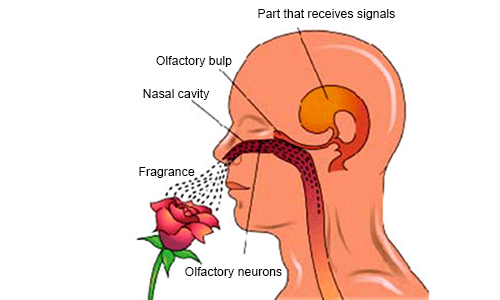
The sense of smell is really marvelous, so are taste, sight and hearing. There is no man-made sound-system that is capable of simultaneously magnifying and damping the sounds, whereas the tympanic membrane created by Allah the Almighty is capable of damping the loud sound and magnifying the low one. Hence, the ear has a sound-system that magnifies and damps the sound.
7- The heart:
The heart pumps 8 cubic meters of blood every day. What a powerful pump it is! It keeps pumping without getting tired or exhausted until man dies, then it stops. A poet said:
A doctor's knowledge enables him to cure people's disease
As long as their death has not come yet
However, the minute death comes,
the doctor is bewildered and the medications fail him
***




